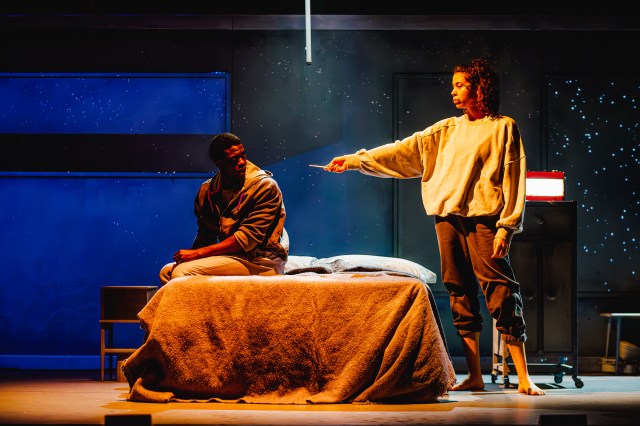
With imitating the dog co-producing with Leeds Playhouse, you know that a production will as much about the on-stage technicalities as narrative or character. With Frankenstein the balance shifts somewhat, but the essence remains the same, and one is still left to query, ‘why?’.
Pete Brooks, Andrew Quick and Simon Wainwright set the play in a modern flat, very grey, with all sorts of opportunities for technical trickery around in Hayley Grindle’s set. A young couple (Georgia-Mae Myers and Nedum Okonyia) live there and at the beginning debate the question of whether to have a baby. They decide yes. Meanwhile the radio is broadcasting an adaptation (by imitating the dog!) of Frankenstein. Over the next nine months the indecisiveness of the couple, notably Myers’ character, about bringing a child into this evil world and the rows this causes are interlinked with the story of Frankenstein. As time passes, we also become engrossed in the fate of some poor soul, obviously an analogue to the Creature, outside the flat.
The broadcast begins at the beginning, on the ice floes with Victor Frankenstein in pursuit of the Creature. Gradually with each broadcast Okonyia takes on the role of Frankenstein, Myers supplying his various interlocutors. Eventually she assumes the role of the Creature itself as the play comes to a bloody end, but not before we learn the fate of the young couple.
The script slips easily into melodrama, but Myers and Okonyia do wonders with what is given them. Okonyia slides from relatively ordinary delivery as the young man (except in odd moments of passion) to violently over-the-top dramatics as Frankenstein. Similarly with Myers, with a special mention for the agonised desperation of the Creature’s last speech. Both are clearly very skilled in physical theatre, twisting and gyrating into all kinds of patterns: they are both highly accomplished even if one might question the dramatic effectiveness of their actions.
But, as always with imitating the dog, it’s the drama of the whole production that compels attention, that irritates or captivates according to your taste. Screens show constantly changing images, snow hurls itself against the walls of the flat, enormous unexpected bangs make the nervous shudder, lights flash on and off, hints of Frankenstein’s electric charge surface from time to time, and so on. A lovely moment is when Captain Walton’s ship frees itself from the ice and a wall of white rushes round the flat.
This is Marmite theatre: a number of audience members left at the interval, while the end of the play was greeted by rapturous applause (though plenty abstained in puzzlement). By now imitating the dog must be accustomed to such divided responses.














